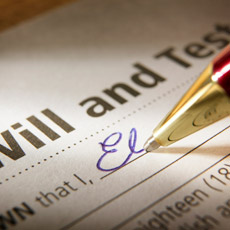
Deadman
Ottawa, ON
Male, 60
I help craft client estate plans; advise estate administrators and substitute decision-makers on their legal authority and responsibilities; and act as a mediator in estate disputes. In responding to your questions, I am providing legal information only; I am not giving legal advice and my response should not be construed as legal advice. Every situation depends on its own facts and you should therefore retain your own lawyer to obtain proper legal advice on your situation.
The whole system of property rights is premised on ownership by a legal entity. Your horse or your cat doesn't qualify. Depending upon the laws of your jurisdiction, it may be possible to create a trust, imposing upon someone the obligation to invest the property and use it to maintain or enhance a pet's quality of life. However, if you have a Galapagos giant tortoise, you are headed for trouble because there are usually legal time limits -- 21 years from the date of the owner's death is typical -- imposed on how long such a trust may run. And remember that preferring a pet over a close relative is likely to cause a (dog)fight after your death.
My own observation after 30 years in practice is that there are two situations where a fight over an estate will break out: firstly, where there is not enough money to go around; and secondly, where there is too much money to go around. There are at least three grounds upon which to challenge a will: (i) the legal formalities for making a will were not observed; (ii) the person who made the will was not mentally capable of doing so at the time; and (iii) the person was subject to undue influence or duress, meaning that it really was not his or her testamentary intention reflected in the document. A fourth possibility in some jurisdictions is that the person left out had some "moral" entitlements; for example, an adult child who appears to have been excluded for no good reason. But keep in mind that there may be serious implications about legal costs if you lose the fight. You may have to pay your own legal costs and a significant part of the legal costs of the "victors".
Well, first you have to be above the age of majority (with limited exceptions) in the jurisdiction where you live to even be permitted to make a will. Assuming that's the case, the most important issue is probably whether you own any assets and have any concern about how they would be distributed if you died without a will. Every jurisdiction will have rules that apply if you die without a will -- "intestate" as we say in the trade. If you were satisfied with the intestate distribution rules, you might decide not to bother with a will. For example, the rule might be that if you have no marital partner and have no children, everything would go to your parents. However, having no will means having no one with authority to dispose of your property without first making a court application to be appointed to carry out that responsibility. Do you really want to enrich a lawyer at the cost of your family?
That depends on whether the will is being submitted to a court for probate. If it is, anyone with a financial interest in the estate can file a caveat or objection to the court's issuance of the grant of probate. One of the objector's allegations may be that the will was forged or tampered with and therefore does not represent the testator's real testamentary intention. An executor who is attempting to administer the estate without probate can be forced to submit the will for probate to confirm its validity, thereby giving the objector an opportunity to challenge the will's validity.
CPR Trainer
 Are men better at CPR than women because they're generally stronger?
Are men better at CPR than women because they're generally stronger?
Social Network Security Manager
 How has Facebook remained mostly immune to hacks?
How has Facebook remained mostly immune to hacks?
Day Care Provider
 Is it ok w/your employer if you babysit one of the kids outside of daycare hours?
Is it ok w/your employer if you babysit one of the kids outside of daycare hours?
That's a tricky question. Not every will of doubtful validity becomes the subject of a court challenge. And of those that do, the dispute may be resolved not as a result of a judicial prounouncement but because of an out-of-court resolution among the interested parties. Without a review of all of the decided cases, no-one could give you an informed response to your question. However, from my observation of the decided cases that come to my attention, I would say that the two most frequent bases are (i) lack of the requisite mental capacity to make a will; and (ii) duress or undue influence. These are the cases where there are factual disputes that drive people into the courtroom.
In most jurisdictions, advances in succession law take place at glacial speed. A will has to be in writing and has to be signed by the testator (sometimes with witnesses, sometimes not). However, some wealth can be conveyed by means of a beneficiary designation -- life insurance proceeds being the most widespread example -- where there is no witnessing requirement. In some jurisdictions, laws have been enacted to allow for electronic signatures in commerce. While such laws usually have an express exclusion for wills, they may not exclude beneficiary designations. In those jurisdictions, it will evidently be possible, by means of an e-mail, to make a beneficiary designation that directs who will receive proceeds of life insurance, a retirement savings plan or a pension plan. Of course, the flip side -- the dark side? -- of such convenience is that it opens the door to fraud. Who is to know whether the deceased, who was found slumped over the keyboard of his computer, was the real author of the e-mail that purported to designate the beneficiary of his life insurance?
That will depend on what your goals are in using a living trust. (Up in the frozen north, we call them inter vivos trusts.) If, as I infer, you are thinking of the living trust as a will "substitute", one of its main advantages is privacy. In contrast to a will, there is no requirement to submit a living trust to the court for validation. Neither the terms of the trust nor the assets it holds would become open to public scrutiny. Nor would your death create any delay in the ability of the trustees of the living trust to continue to deal with the trust property. Remember that making a will does not affect your current ownership of your property because the will does not take effect until your death. By contrast, putting property into a living trust means an actual transfer of legal ownership from yourself to the trust, so you would want to be sure that in doing so you are not putting any constraints on your ability to deal with the property as you see fit. (Of course, if you are looking at a living trust as a means of asset protection, you may indeed want to limit your access to the property so as to protect it from future claims of creditors.) The last point to consider is whether a transfer of your property into a living trust would create any unintended consequences. Up my way, such a transfer can give rise, among other problems, to immediate income tax consequences. You would have to talk to a lawyer and/or tax professional to see what a property transfer might mean for you.
-OR-
 Login with Facebook
Login with Facebook (max 20 characters - letters, numbers, and underscores only. Note that your username is private, and you have the option to choose an alias when asking questions or hosting a Q&A.)
(A valid e-mail address is required. Your e-mail will not be shared with anyone.)
(min 5 characters)
By checking this box, you acknowledge that you have read and agree to Jobstr.com’s Terms and Privacy Policy.
-OR-
 Register with Facebook
Register with Facebook(Don't worry: you'll be able to choose an alias when asking questions or hosting a Q&A.)